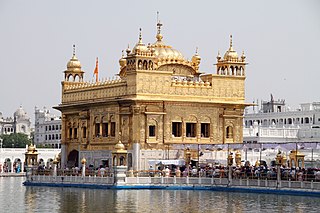
Sikhism, also known as Sikhi, is an Indian religion and philosophy that originated in the Punjab region of the Indian subcontinent around the end of the 15th century CE. It is one of the most recently founded major religions and among the largest in the world with about 25–30 million adherents.

Nankana Sahib is a city and capital of Nankana Sahib District in the Punjab province of Pakistan. It is named after the first Guru of the Sikhs, Guru Nanak, who was born in the city and first began preaching here. Nankana Sahib is among the most important religious sites for the Sikh religion. It is located about 91 km (57 mi) west of Lahore and about 75 km (47 mi) east of Faisalabad. According to the census of 2017 the city has a population of 110,135 inhabitants. Until 2005, it was a part of the Sheikhupura District.

A gurdwara or gurudwara is a place of assembly and worship in Sikhism, but its normal meaning is "place of guru" or "Home of guru". Sikhs also refer to gurdwaras as Gurdwara Sahib. People from all faiths and religions are welcomed in gurdwaras. Each gurdwara has a Darbar Sahib where the Guru Granth Sahib is placed on a takht in a prominent central position. Any congregant may recite, sing, and explain the verses from the Guru Granth Sahib, in the presence of the rest of the congregation.
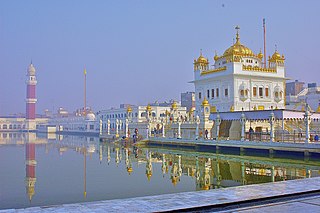
Tarn Taran Sahib is a city in the Majha region of the state of Punjab, in northern India. It is the district headquarters and hosts the municipal council of Tarn Taran district. Gurdwara Sri Tarn Taran Sahib, a prominent Sikh shrine, is located in the central part of the city.

Batala is the eighth largest city in the state of Punjab, India in terms of population after Ludhiana, Amritsar, Jalandhar, Patiala, Bathinda, Mohali and Hoshiarpur. Batala ranks as the second-oldest city after Bathinda. It is a municipal corporation in Gurdaspur district in the Majha region of the state of Punjab. It is located from holy city Amritsar 39 km and about 32km from Gurdaspur, the headquarters of the district. It is also a Police district. Batala holds the status of the most populated town of the district with 31% of the district's total population. It is the biggest industrial town in the district.

Guru Nanak Gurpurab, also known as Guru Nanak Prakash Utsav, celebrates the birth of the first Sikh guru, Guru Nanak. One of the most celebrated and important Sikh gurus and the founder of Sikhism, Guru Nanak is highly revered by the Sikh community. This is one of the most sacred festivals in Sikhism, or Sikhi. The festivities in the Sikh religion revolve around the anniversaries of the 10 Sikh Gurus. These Gurus were responsible for shaping the beliefs of the Sikhs. Their birthdays, known as Gurpurab, are occasions for celebration and prayer among the Sikhs.
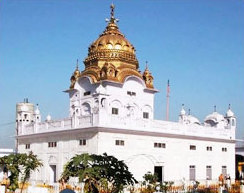
Dera Baba Nanak is a town and a municipal council in Gurdaspur district, in the state of Punjab, India. It is the sub-district headquarters of Dera Baba Nanak tehsil. It is 36 km away from Gurdaspur city, the capital of the district. Since November 2019, a corridor between India and Pakistan has been established at its shrine.

Kartarpur is a town located, just 102 km from Lahore city in the Shakargarh Tehsil, Narowal District in Punjab, Pakistan. Located on the right bank of the Ravi River, it is said to have been founded by the first guru of Sikhism, Guru Nanak, where he established the first Sikh commune.

Nanakpanthi, also known as Nanakshahi, is a syncretist movement which follows Guru Nanak (1469–1539), the founder of Sikhism, but without necessarily formally identifying as being Sikh in terms of religious affiliation, as it's the case with numerous Punjabi Hindus and Sindhi Hindus.

Sikh architecture is a style of architecture that was developed under the Sikh Confederacy and Sikh Empire during the 18th and 19th centuries in the Punjab region. Due to its progressive style, it is constantly evolving into many newly developing branches with new contemporary styles. Although Sikh architecture was initially developed within Sikhism its style has been used in many non-religious buildings due to its beauty. 300 years ago, Sikh architecture was distinguished for its many curves and straight lines; Keshgarh Sahib and the Harmandir Sahib are prime examples.

Sardar Gurbachan Singh was a Sikh scholar, professor, and author. He was born in Moonak, Sangrur district. He was a lecturer at the Sikh National College at Lahore. At the Banaras Hindu University he held the Guru Nanak Chair of Sikh Studies. He received the Padma Bhushan in 1985. He received in 1985 the National fellowship by the Indian Council of Historical Research, New Delhi.
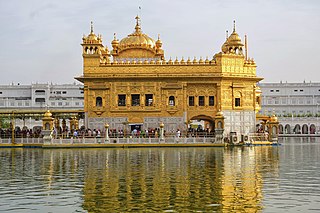
Indian Sikhs number approximately 21 million people and account for 1.7% of India's population as of 2011, forming the country's fourth-largest religious group. The majority of the nation's Sikhs live in the northern state of Punjab, which is the only Sikh-majority administrative division in the world.
Nirankari is a sect of Sikhism. It was a reform movement founded by Baba Dyal Das in northwest Punjab in 1851. He sought to restore the practices and beliefs of Sikhs back to what he believed were prevalent when Guru Nanak was alive. This movement emerged in the aftermath of the end of Sikh Empire and the Sikh history after Ranjit Singh's death.

Baba Guru Nanak University is a public university located in Nankana Sahib, Punjab, Pakistan, the birthplace of Guru Nanak. On 28 October 2019, Prime Minister of Pakistan, Imran Khan laid the foundation stone of the university.

Gurdwara Darbar Sahib Kartarpur, also called Kartarpur Sahib, is a gurdwara in Kartarpur, located in Shakargarh, Narowal District, in the Punjab province of Pakistan. It is built on the historic site where the founder of Sikhism, Guru Nanak, settled and assembled the Sikh community after his missionary travels and lived for 18 years until his death in 1539. It is one of the holiest sites in Sikhism, alongside the Golden Temple in Amritsar and Gurdwara Janam Asthan in Nankana Sahib.
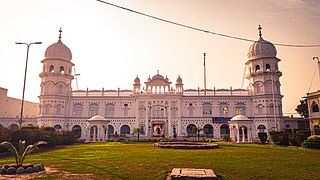
Gurdwara Janam Asthan, also referred to as Gurdwara Nankana Sahib, is a highly revered gurdwara that is situated at the site where the founder of Sikhism, Guru Nanak, was born. The shrine is located in Nankana Sahib, Punjab, Pakistan.

Rababi is a term used to refer to a player of the rabab instrument.

The Kartarpur Corridor is a visa-free border crossing and religious corridor, connecting the Gurdwara Darbar Sahib, near Narowal in Pakistan to Gurudwara Dera Baba Nanak, Gurdaspur district, Punjab, India. The crossing allows devotees from India to visit the gurdwara in Kartarpur, Pakistan, 4.7 kilometres from the India–Pakistan border on the Pakistani side without a visa. However, Pakistani Sikhs are unable to use the border crossing, and cannot access Dera Baba Nanak on the Indian side without first obtaining an Indian visa or unless they work there.
Gurdwara Shaheed Bhai Taru Singh or Gurdwara Shahidi Asthan Bhai Taru Singh ji is a Sikh Gurdwara at Naulakha Bazaar in Lahore, Pakistan, which commemorates the spot where Bhai Taru Singh was executed. The shrine was built on the grounds of the Shaheed Ganj Mosque, leading to a legal dispute over ownership that began in 1850. British, and later Pakistani, courts upheld the right of Sikhs to maintain a place of worship at the site. While a settlement was being negotiated by British authorities, a group of Sikhs demolished the mosque on 7–8 July 1935, triggering communal riots. In December 2022, Pakistan’s Evacuee Trust Property Board closed it to the public.
Amardeep Singh is an Indian researcher, writer, photographer and documentary filmmaker based in Singapore. Currently, he and his wife, Vininder Kaur, are the managing directors of Lost Heritage Productions, a media production house started by them. He formerly worked in the financial sector as an executive. He won the Guru Nanak Interfaith Prize in 2022 for retracing the journey of Guru Nanak, the first Sikh Guru, in his docu-series Allegory: A Tapestry of Guru Nanak's Travels.















